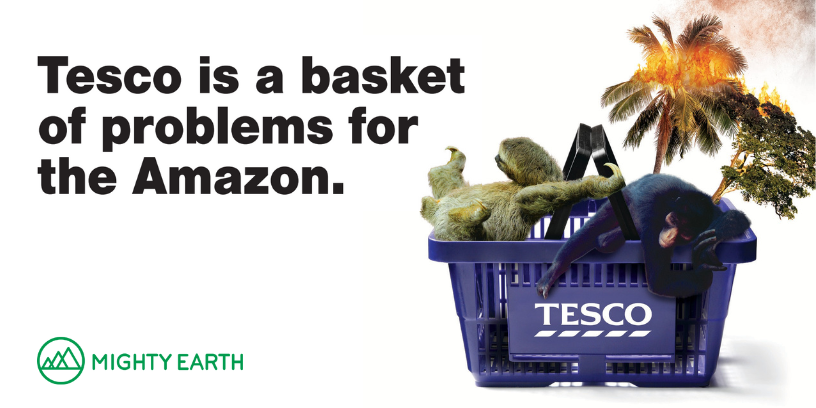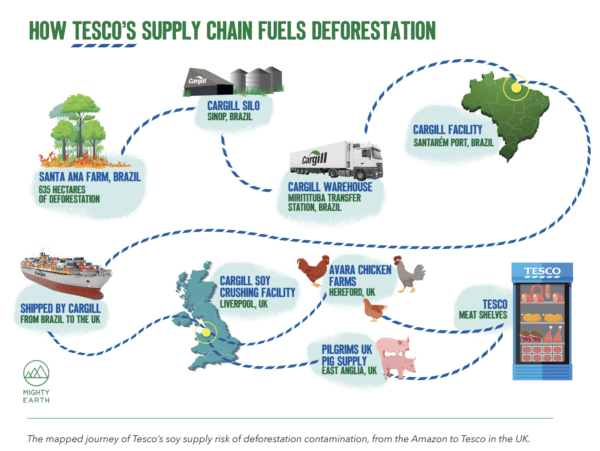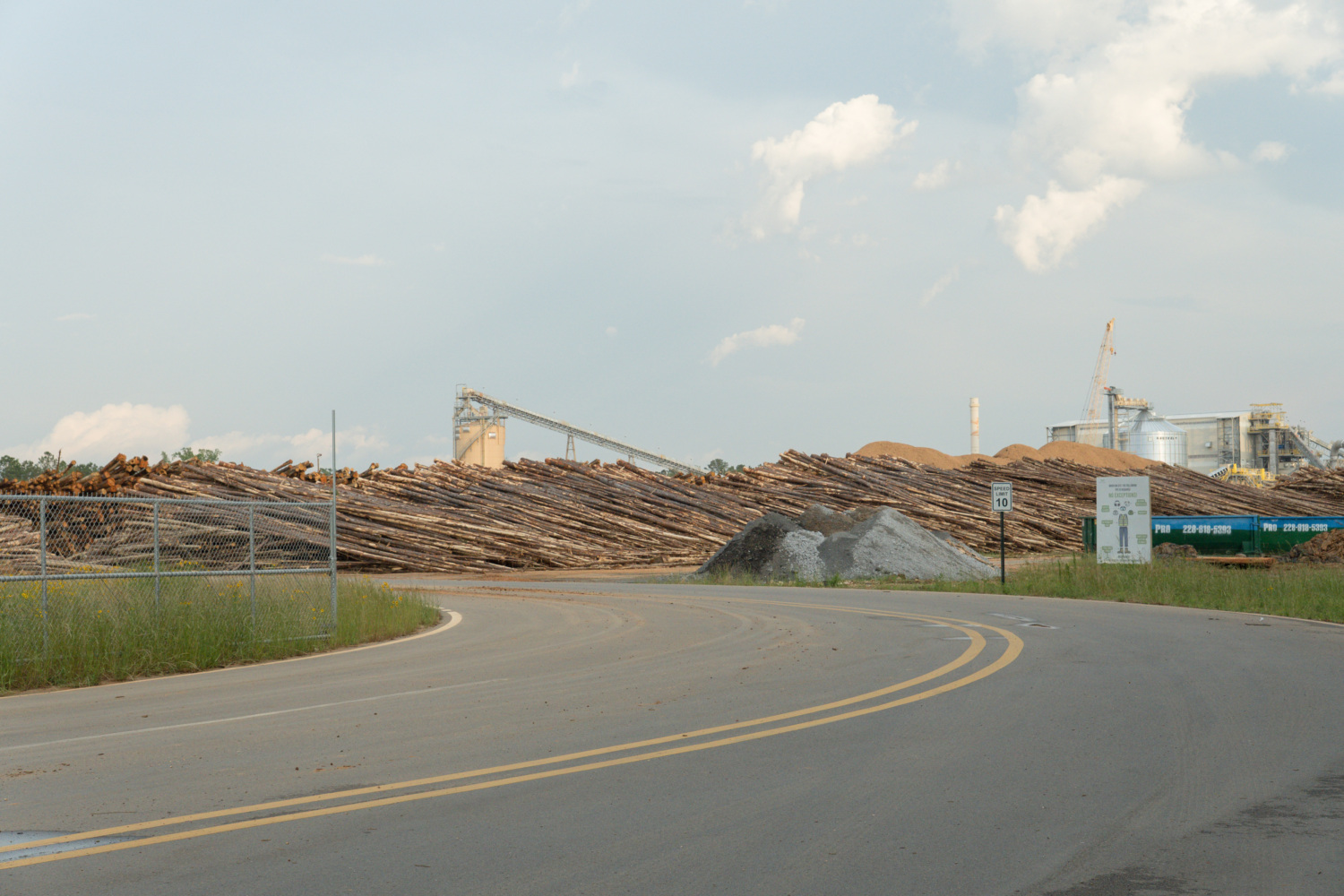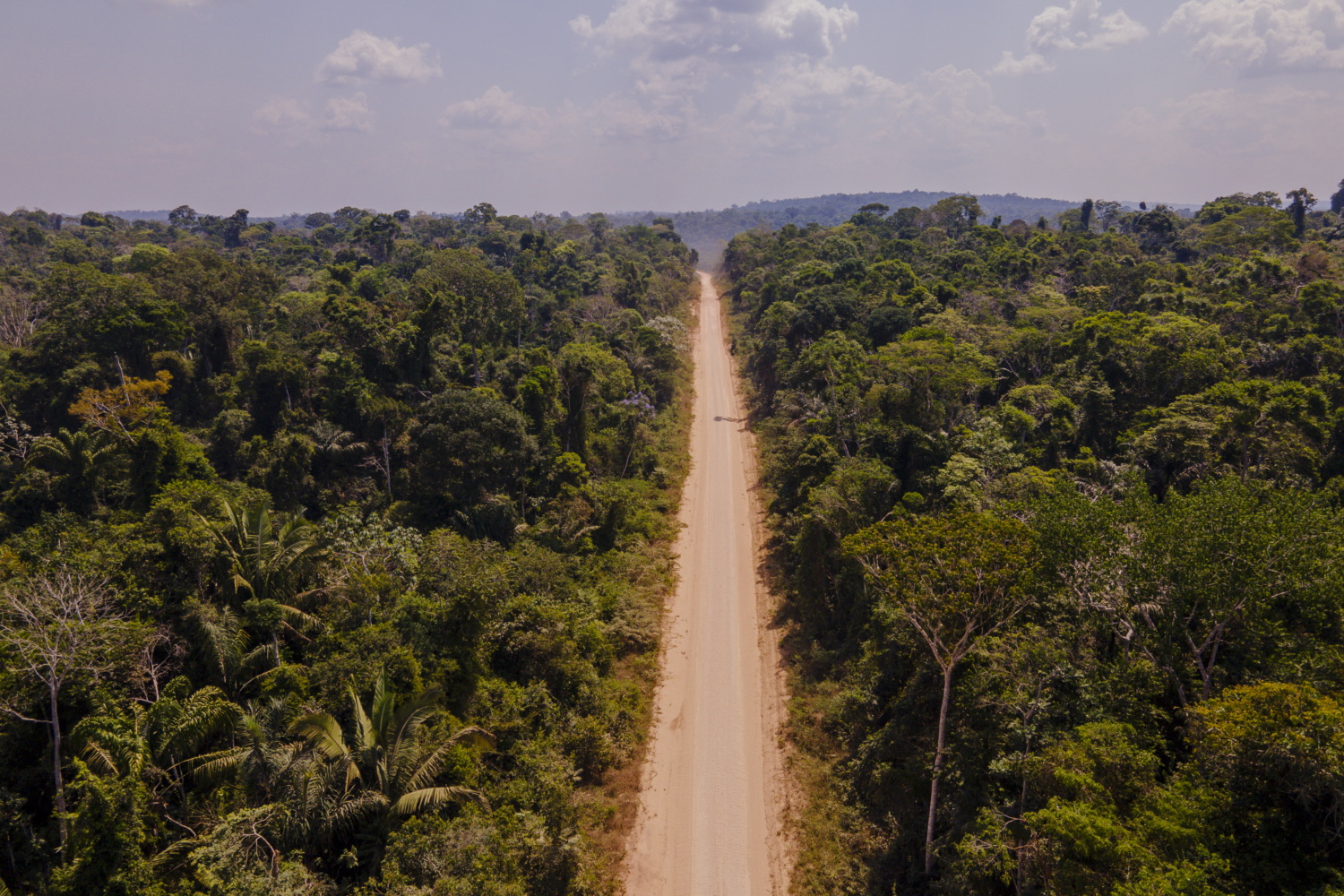
Tesco: A basket of problems for the Amazon
Link to report here Link to video here
New report by Mighty Earth shows chicken and pork products sold in Tesco’s UK stores linked to Amazon deforestation, equivalent to 560 Wembley pitches
A new Mighty Earth report, “Tesco: A basket of problems for the Amazon,” shows chicken and pork products sold in Tesco stores are linked to recent, illegal fires and deforestation of 400 hectares of Brazilian Amazon rainforest, equivalent to 560 Wembley football pitches, and the loss of more than 220,000 trees. It follows a thorough investigation mapping Tesco’s full soy supply chain from farm level in the Amazon, via US agricultural giant Cargill, on to UK meat producers Avara and Pilgrim’s UK, and finally to the shelves of the UK’s biggest retailer.
Meat products found on Tesco’s shelves linked to deforestation-risk soy from the Amazon include Tesco branded chicken breasts, tenders and chicken nuggets. For the first time, our investigation made links from Cargill to a leading UK pork supplier and trading division of Pilgrim’s UK, direct suppliers to Tesco.
The joint investigation by Mighty Earth, Ecostorm and Repórter Brasil documents evidence of illegal fires set in September 2022, used to clear forests to grow high-protein soy, to feed pigs and poultry reared intensively in factory farms in the UK. The Brazilian farm in question, Santa Ana located in the Mato Grosso region, had previously been blocked as a Cargill supplier, but at the time of the investigation was said by Cargill to comply with regulations to prevent deforestation. Our investigation also uncovered evidence of grain laundering, where legally grown soy is mixed with soy grown on illegally deforested land.
Our report highlights that the illegal fires and forest clearing at Santa Ana farm breach the Amazon Soy Moratorium (ASM), Brazilian laws, the UK Soy Manifesto’s commitment, and Cargill’s own policies. The ASM bans the sale of soy grown on land deforested after 2008.
Mighty Earth is urging Tesco to drop soy suppliers such as Cargill that have been persistently linked to alleged deforestation and ecosystem destruction in the Amazon and other threatened biomes in Latin America, such as the Cerrado savannah and the Pantanal.
Key findings:
- Satellite images of Cargill supplier Santa Ana farm, situated in Mato Grosso, show a total of 635 hectares of Amazon deforestation, 400 hectares of which were burned within a few days in September 2022. That’s equivalent to 560 Wembley pitches.
- Our joint investigation maps the soy supply chain from Santa Ana farm in Mato Grosso in Brazil to the UK and highlights deforestation contamination of Cargill’s Brazilian soy supply, which makes up 70% of the UK’s total soy imports. 75% of Cargill’s UK supply originates from Santarém port in Pará in Brazil.
- New evidence from our soy investigation uncovered how the British pork sector also has links, via feed suppliers, to Amazon deforestation.
- Our investigation maps multiple suppliers – which risk being contaminated with deforestation-risk soy through Cargill’s supply – to Tesco across a range of chicken and pork products sold online and on its supermarket shelves.
- In January and February 2023 our investigation established that an Avara animal feed mill in Hereford in the UK is supplying soy meal feed to chicken farms in the county.
- Our investigation documented, for the first time, grain deliveries from Frontier Agriculture, a joint Cargill-Associated British Foods venture, to ForFarmers feed mill. It supplies BQP farms, which supplies pork and is a trading division of Pilgrim’s UK, direct suppliers to Tesco.
- A recent Human Rights Assessment report, prepared on behalf of Pilgrim’s UK, estimated 65% of its pork was supplied by BQP. ForFarmers previously admitted that approximately 14% of its UK soy is sourced from Brazil.
Soy journey from Amazon farm to Tesco shelves

Gemma Hoskins, UK Director at Mighty Earth said:
“Our investigation shows Tesco is a basket of problems for the Amazon. While the UK’s top retailer reaps massive profits, it continues to do business with known forest destroyers such as Cargill, adding fuel to the fire of Amazon deforestation, harming the health of local communities, and decimating wildlife and precious habitats.”
“We’ve shown that soy grown on recently burnt and deforested land in the Amazon risks entering the Cargill supply chain to feed chicken and pigs reared intensively on factory farms in the UK, before ending up in Tesco’s meat aisles.”
“Business as usual isn’t an option if we want to tackle the climate emergency. Tesco should only source from companies that don’t put the Amazon and other precious biomes at risk. That means cutting ties with Cargill urgently.”
Impact on Tesco’s deforestation commitments
Tesco has committed to a 2020 cut-off date for deforestation and to source 100% of its soy from Deforestation and Conversion-Free (DCF) areas by 2025, including all forms of deforestation, both legal and illegal. That means it cannot buy goods from land deforested after 2020. Our new evidence shows that Tesco’s 2020 cut-off date has been breached and indicates that its 2025 target is likely unachievable, while it continues to source such high volumes of soy from Cargill. Its target date of DCF by 2030 is incompatible with Tesco, and with incoming due diligence laws in the UK, designed to clean up forest-risk supply chains.
Cargill’s flawed supply chain
Cargill insists it has robust procedures in place to prevent deforestation from entering its soy supply chains and for farms to comply with the ASM and Brazilian law. It maintains that when the Santa Ana farm was added to the Soy Moratorium’s prohibited list in May 2021, Cargill immediately blocked purchases from the farm in question. However, Cargill says it unblocked the Santa Ana farm in June 2022, just months before a further 400 hectares of deforestation occurred. In a recent statement to Mighty Earth, Cargill said about the Santa Ana farm:
“As reported in our Soy Report, once a farm is blocked, there is a robust process in place that must be followed for a farm to be unblocked. In this case [referring to the Santa Ana farm], in the following year, the farmer proved compliance with the Soy Moratorium, which was validated by the governing organizations and NGOs. As a result, in June 2022, the farmer was removed from the Soy Moratorium embargo list and, therefore, unblocked in Cargill’s system. The supplier remains compliant with the Soy Moratorium rules.”
This case is not an exception and highlights the fundamental flaws across Cargill’s soy related deforestation monitoring and enforcement systems, leading to the risk of contamination of Cargill soy sold across the whole of the UK’s farming, food, and retail sectors.
Glenn Hurowitz, founder, and CEO at Mighty Earth said:
“Cargill maintains it put the Santa Ana farm back on its books in June 2022 as it complied with all the necessary rules and yet less than three months later, teams on the ground documented illegal fires and a staggering 400 hectares of deforestation on the farm.”
“If Cargill, the biggest privately-owned US company, wants to be part of the solution to the climate and nature crisis, it needs to source from suppliers farming on previously degraded land, of which there are 1.6 billion acres in Latin America, alone. Not from those who are still torching forests.”
“Cargill urgently needs to increase its ambition in line with its competitors and customers and bringing forward its deforestation target to from 2030 to 2025. We can’t allow another seven years of deforestation if we’re to save what’s left of the Amazon and avoid the worst impacts of climate change.”


